Changing infant mortality narratives with azithromycin access through Nigeria’s SARMAAN project
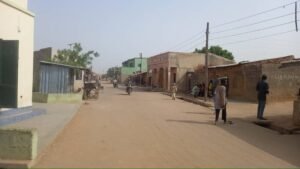

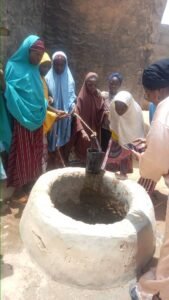
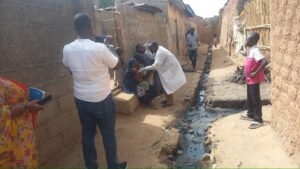
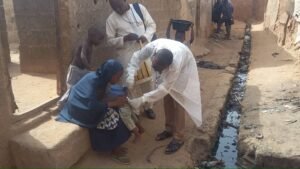
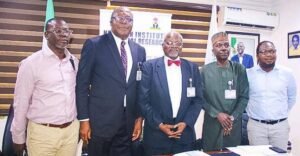
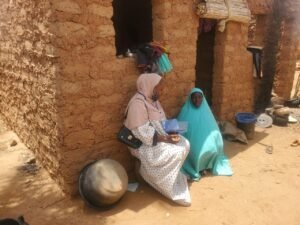
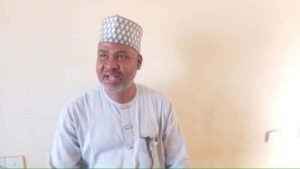
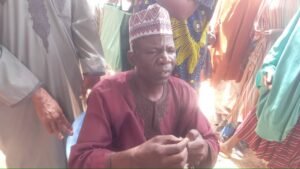











By Magdalene Ukuedojor
Mr EricJames Ochigbo is all smiles and pride as he strides into his office; as a journalist, his work hours are spent investigating reports, attending events and meeting deadlines.
This radiance is not from breaking a big news story or catching up with a long sought-after news source, but purely of rest and bonding.
Ochigbo, after a 14 working day paternity leave, can bounce back to work happy, rested and fulfilled.
“I had my first baby, a baby girl, in December.
“Luckily for me, paternity leave was approved by the Federal Government the month before, without it, I wouldn’t know how to cope with my busy work schedule.
“My wife gave birth towards the end of the year, a festive and very busy period, it would have been very difficult to cope with the delivery and work, being a first-time dad.
“When I took out the 14 days, it gave me time to rest because the pressure of work was taken off me and then I was able to concentrate more on the demands of fatherhood.
“I took over the cooking and I carried the baby a lot and we bonded very closely; I rocked the baby while my wife rested.
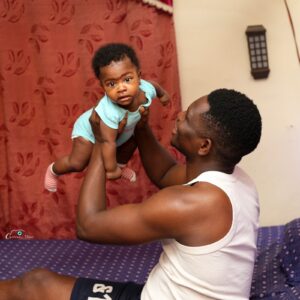
“This way, she healed faster and was stronger to care for her when I returned to work.
“It was a wonderful time, I wish men could be given more days,” Ochigbo said.
Since the establishment of the News Agency of Nigeria (NAN) in 1976, the media outfit where Ochigbo works, no male officer had enjoyed paternity leave prior to his.
The Nigerian Civil and Public Service did not institute paternity leave for male officers until 2022 when the feat was accomplished by the President Muhammadu Buhari-led Administration.
Government prioritised women who benefitted immensely from maternity leave over the years while men clamoured for same.
Now, based on the circular with ref no: HCSF/SPSO/ODD/NCE/RR/650309/3, dated 25th November, 2022, men in the federal civil service, are entitled to paternity leave.
The then Head of the Civil Service of the Federation, Dr Folasade Yemi-Esan, said the leave was in line with the provisions of the Public Service Rules, 2021 Edition.
“Government has approved paternity leave for serving male officers whose spouse delivers a baby.
“The period of the leave shall be fourteen working days. The leave shall not be more than once in two years, and for maximum of four children,” she said.
The Federal Government went further to ensure that families with adopted babies were equally captured in the circular and reviewed Public Service Rules.
“Where the family of a male officer adopts a child under four months old, the officer will similarly enjoy paternity leave for a period of fourteen working days,” Yemi-Esan said.
What are the requirements needed to obtain paternity leave in the Federal Civil Service?
The male officer must be married and known to be married.
He must provide the Expected Date of Delivery’s report of his wife or evidence of approval of the adoption of the child by the relevant government bodies.
He must apply for the leave with the documents.
He can only be granted the leave once in two years.
How did the Federal Government achieve this feat?
Yemi-Esan explained that different union bodies clamoured for it, noting that bonding was important to help a newly born or adopted baby properly bond with the father in the early period.
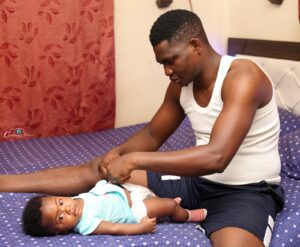
Also, the Office of the Head of the Civil Service of the Federation (OHCSF) looked into international best practices in other climes, brainstormed at different stakeholders’ committees for a template.
The OHCSF, responsible for the leadership, management and capacity development of the Federal Civil Service to implement federal government’s policies and programmes, included the paternity leave in the reviewed Public Service Rules.
Mr Lawrence Nwaka, Special Assistant to the Permanent Secretary, Service Policies and Strategies Office, OHCSF, said that the reviewed rule was presented at the Federal Executive Council Meeting for approval.
“The paternity leave is a response of the Office of the Head of Civil Service of the Federation to the yearnings and aspirations of male civil servants.
“Who would love to be with their wives in the days following the delivery of their newborn babies in order to provide fatherly care for both mother and child.
“The circular emanated after the approval of the Public Service Rule 2021 at the Federal Executive Council; paternity leave wasn’t there in the last Public Service Rule 2008.
“It was reviewed, so following the review, it was necessary to include it in the Public Service Rule; it is one of the new items included in the new Public Service Rules 2021,” he said.
What impact has this leave created for male civil servants?
“It is most welcome; since we commenced implementation of the paternity leave, a lot of male civil servants have benefitted from it.
“People go on paternity leave and when they come back they are all beaming with smiles and you know it is new, we are beginning to see joy in the hearts of men.
“I tell you, taking care of four children myself, it is not easy for a mother, especially those that pass through caesarean section to cope alone.
“I wish we were able to make it one month; it would have been sweeter but 14 working days is like three weeks.
“I think it’s a very good beginning, maybe as time goes on the rule may be reviewed,” Nwaka said.
More so, a cross-section of views from male officers in federal establishments showed the challenges men faced combining work with the home front, especially during delivery and first few months with a newborn.
Mr Tomilayo Adedeji, an administrative officer and father of three, said he almost got a query from his office when his last child was born in 2019.
He opted for casual leave to attend the child’s naming ceremony.
“With my third child, I was called from the office that my wife had delivered so I rushed to the hospital.
“Because of running here and there to do some things, I couldn’t come to the office for two days; my supervisor then was very cross.
“I had to apply for casual leave for my child’s naming ceremony day.
“During that time, I could only help my wife during weekends and nights and sometimes she was too tired to attend to the baby because he wants to play at night.
“I would have to carry him and also attend to his older siblings; it took a toll on my job.
“Getting to the office I feel tired, worn out and mostly feel like sleeping but with paternity leave, fatherhood and bonding with a newborn will come easier.
“So I feel paternity leave is very good; it is key because there is a lot that men can achieve during that time,” Adedeji said.
Mr Mathew Anya, an engineer, said with every of his four children, he had to joggle running the home, hospital and meeting contract deadlines.
“The only thing that keeps me going at this time is the joy of having a baby and that my wife delivered safely.
“But like most men, we become lean, tired, don’t eat properly and are very distracted at work because your time is needed mostly at home.
“Women don’t understand that you need to work, they need you to be a husband and father,” Anya said.
On the medical standpoint, Dr Inyang Asuquo, a gynaecologist, highly recommends paternity leave for the well-being of the man, woman and newborn.
“The philosophy behind paternity leave is to give some ample time, though not enough, to be at home and support your wife or in the hospital if there are complications, and also bond with your child.
“Prior to this period where government did not consider paternity leave it was a real struggle for a lot of men who really understand the concept of marriage.
“As doctors, we hear and know a lot, so for the government to graciously approve this leave, our patients, the women, are happy. Their husbands now do much more for them.

“Paternity leave also goes a long way to help mothers with post-partum depression; with the presence of mind and body of their husbands, it is detected early and they can seek help.
“So we thank the Federal Government for this initiative,” Asuquo said.
Moreso, Neuroscience research shows that when fathers actively bond with their babies, the child’s brain develops more synaptic connections, leading to enhanced learning and emotional regulation later in life.
Successful father-infant bonding during the immediate postpartum period has been shown to have several benefits for the infant: it reduces cognitive delay, promotes weight gain in preterm infants, and improves breastfeeding rates.
Fathers engaging with their infants through skin-to-skin contact, feeding, and playtime contribute significantly to a baby’s neurological development.
By establishing an early connection, fathers help their children develop a sense of security, which translates to reduced stress and anxiety levels in the baby.
According to baby360.com, a platform that caters to parents from prenatal, postpartum to parenting with up-to-date maternity education materials, it also shows an increasing amount of research which suggests a strong correlation between early father-infant bonds and the happiness of the entire family.
Strong father-child bonds can help counter issues such as depression later on in life.
Men who report that they had a good relationship with their fathers during childhood were found to be better equipped to handle stress.
A child’s physical and mental development is significantly boosted when his dad has played with him from the start, compared to children whose fathers took a more hands-off approach.
Children who experienced close interactions with their fathers from an early age tend to be more successful academically, have better relationships with their peers and be less likely to get involved with crime or abuse drugs and alcohol.

For fathers, they experience less stress and increased confidence when they have their own special time with their newborns.
Actively participating in caregiving gives them a deeper sense of fulfilment and purpose. It also boosts their confidence as parents, helping them overcome societal stereotypes that often place fathers in secondary roles.
Besides, bonding helps dads develop empathy, patience, and a keen understanding of their baby’s nonverbal cues, strengthening their ability to nurture effectively.
In spite of the many benefits of paternity leave, the move is not welcome by all men in the federal service.
“I prefer it to be monetised; what some women want is not to see your face; they need money to cater to the bills and for pampers and baby food.
“What good is it hanging around the house for three weeks when you can’t provide for them, that will even cause undue stress for the man,” Mr Ahmed Lawal said.
Mr Adekunle Atolagbe shares Lawal’s views: “Except grandparents and in-laws are not in the picture to help out with the newborn, some men would find it difficult to be at home.
“And if they are around, the husband becomes an easy target for errands because they see you around, so I’d prefer to be at work to hustle for money to support them at home.
“Men are not cut out for care of newborns, many fathers are practically afraid of caring for newborns because they are so delicate,” he said.
Also, some women hope that husbands in the private sector and state government service would be given some relief and time to bond with their newborns.
They, however, are of the opinion that the men utilise it for the purpose.
“Fathers should be given three months’ paternity leave at least.
“But only for those who will truly help out at home because I don’t know what I would have done without my husband’s support,” Mrs Irene-Igho Effanga, a mother of triplets said.
In all, the Office of the Head of Service of the Federation and administrative arms of federal ministries, departments and agencies have the Public Service Rules for checks and balances and to review polices to help civil service officers bond better with their families.
Since government is a continuum, Mrs Didi Walson-Jack, the current Head of the Civil Service of the Federation, has also pledged commitment to overhauling Nigeria’s civil service with a significant shift, just like the paternity leave, to ensure professionalism, efficiency and accountability, with commendable focus on the welfare and performance of civil servants. (NAN)(www.nannews.ng)
By Aisha Gambo
A Report Women! Female Reporters Leadership Programme (FRLP) Fellow, Aisha Gambo, on Thursday trained Mass Communication students at the Kaduna State University (KASU) on Solutions Journalism (SOJO).
The training is part of a leadership project conducted by Report Women!FRLP fellows, with support from the Wole Soyinka Centre for Investigative Journalism (WSCIJ).
Gambo, who is also a Senior Correspondent with the News Agency of Nigeria (NAN), stated that the training was aimed at equipping the students with practical knowledge and skills on SOJO.
” We are not just training these students, we will encourage them to start identifying responses in their communities and reporting them.
“There are lots of opportunities in the field of Journalism especially Solutions Journalism; we will be sharing these opportunities with them to make them more competent,” she said.
While speaking, Mr Nathaniel Bivan , a Solutions Journalist, who presented a slide on ‘Finding and Reporting Excellent Solution Stories”, said students of mass communications should start writing these stories while in school.
He explained that a good solutions story must contain the four pillars of SOJO: Response, evidence, insight and limitation, adding that the students should aim at writing stories that make impact.
Another speaker, Yahuza Bawage who started practising journalism at school, urged mass communications students to start writing early so as to build a portfolio that would attract opportunities for them when they leave school.
He urged the students to form a union for campus journalists which would serve as a platform for them as students-journalists, adding that it would help them secure opportunities for capacity building and career development.
Some of the students, who participated in the training commended the organiser, saying that the session was eye-opening.
Amina Abdulkadir said she was hearing solutions journalism for the first time, adding that the training had helped her understand the concept and how to properly write SOJO stories.
Another participant, Usman Hassan, who is also a 400-level student, said he would step down the training to his colleagues in the Department and was ready to start writing SOJO stories.(NAN) (wwwnannews.ng)
Edited by Bashir Rabe Mani
Malam Abdullahi Ibrahim is one of the fathers who had vowed never to allow any of his eight children access to immunisation of any sort.
He just didn’t trust the process; that a drop in the mouth, a tablet or injection could prevent polio, measles or tuberculosis was too good to be true.
Ibrahim believed in local herbs, his forefathers had toiled the grounds, fed from it and explored roots, herbs and plants for ailments.
In spite of the viable medicinal stance, he had observed the menace of polio and other vaccine-preventable diseases in his community, the struggle the affected children faced as they grew to adulthood and the toll it left on their families.
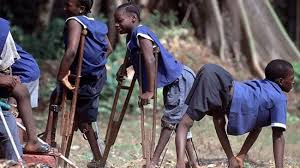
Health officials from the Akko Primary Healthcare Centre, Garko Ward, had told Ibrahim and other fathers, whose consent was needed for immunisation uptake, that routine immunisation from birth could prevent the diseases.
The centre often sensitised the community, educating households on the various vaccinations to be taken.
According to the National Programme on Immunisation, routine immunisation of children in Nigeria is carried out using the following vaccines:
•BCG (Bacilli Calmette Guerin) — at birth or as soon as possible after birth
•OPV (Oral Polio Vaccine) — at birth and at 6, 10, and 14 weeks of age
•DPT (Diphtheria, pertussis, tetanus) — at 6, 10, and 14 weeks of age
•Hepatitis B — at birth, 6 and 14 weeks
•Measles — at 9 months of age
•Yellow Fever — at 9 months of age
•Vitamin A — at 9 months and 15 months of age
The immunisation prevents tuberculosis, whooping cough, polio, measles, hepatitis, among other diseases.
The Federal Ministry of Health and Social Welfare, in collaboration with state ministries of health and primary health centres provide parents or guardians with health cards to track the uptake. Each dose is recorded, the date taken and next due date indicated for easy tracking.
Ibrahim never paid attention to the health workers until a group of fathers, including officials of the Akko Emirate Council, approached him at home, breaking down the information from the health care centre and the benefits vaccines have.
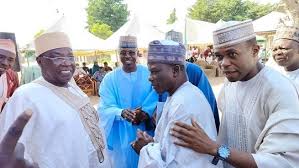
“The team did not relent, they would visit me at home, in my farm, on the way to prayers, telling me of the benefit of immunisation.
“Little by little my doubts were cleared and this April 2025 polio vaccination, for the first time, I gave consent and my children got vaccinated,” Ibrahim said.
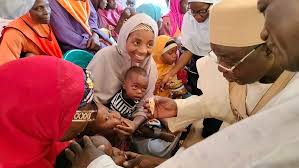
With continued government advocacy and the buy-in of traditional rulers, groups like the Fathers’ Rapid Response Team are formed by communities to engage fellow community members on government initiatives and benefits to the people.
Malam Mohammed Lawan, the Primary Health Care Coordinator of Akko Local Government, Gombe State, emphasises the critical role the Fathers’ Rapid Response Team has played in rebuilding community trust.
He says the team was established as a strategic response to vaccine hesitancy, recognising the influential role fathers play within families and communities.
“By integrating trusted voices from these critical sectors, the team aims to bridge the gap between healthcare providers and the public, fostering greater understanding and acceptance of vaccines.
“We realised that resistance was rooted in feelings of neglect, especially regarding the lack of access to state government palliatives and long-lasting insecticidal mosquito nets.
“By sending fathers to speak to other fathers, we were able to hear their grievances, correct misinformation, and encourage them to prioritise their children’s health,” he says.
With the intervention of the Fathers’ Rapid Response Team, 55 households in Garko Ward, who before now were resistant to immunisation, have fully complied and vaccinated their children.
Lawan describes the reduction in resistance from 70 to 15 households as a significant achievement but notes that the goal is to reach zero resistance.
“Every child deserves protection,” he adds, reaffirming their commitment to fully immunise all eligible children in Garko Ward.
The Fathers’ Rapid Response Team has remained a significant breakthrough for public health efforts as Alhaji Tasiu Yakubu, a father of two from Unguwan Liman in Garko Ward, also reversed his stance on polio immunisation, allowing his children to receive the vaccine after initially resisting the campaign.
His change of heart was influenced by the Fathers’ Team and his children’s teacher, who also served as the vaccinator.
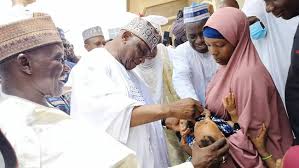
Yakubu had been one of several parents sceptical about the vaccine, questioning the government’s focus on polio while, according to him, other serious diseases, like hepatitis, remained overlooked.
“My argument was, why the emphasis on polio alone? Hepatitis is also deadly and widespread,” he says.
However, after a patient discussion with the Fathers’ Rapid Response Team and his children’s teacher, his perspective shifted. “They took their time to explain everything to me.
“They told me about the dangers of polio, the importance of prevention, and how it affects children for life. I became convinced,” he says.
Moreso, Malam Yunusa Musa and Umaru Mazadu of Jauro Jatau Community, who had long mistrusted government health initiatives, were also convinced after personalised engagements from the team.
They remain vocal, however, about their broader concerns, insisting that the same effort shown in delivering vaccines should be extended to other critical needs like palliatives and infrastructure.
Malam Shuaibu Ahmed, a father of four, commends the government and international organisations like the United Nations Children’s Fund (UNICEF) for providing the polio vaccine free of charge.
He expresses confidence in the vaccine’s safety, highlighting that none of his children had experienced any issues following vaccination.
Ahmed encourages other parents to vaccinate their children, stressing the importance of supporting vaccination campaigns for the well-being and future health of the community.
The Ward Head of Unguwan Liman, Malam Abubakar Mohammed, confirms that proactive community sensitisation has been crucial.
“We don’t wait. Whenever we see a gathering of men or go to the mosque, we talk to people about the importance of child immunisation,” he says.
Malam Umar Ahmed, Secretary of the Akko Emirate Council and a representative of the Fathers’ Response Team, says they leave no stone unturned in their efforts to ensure that people are adequately sensitised, with the aim of making vaccine hesitancy a thing of the past across the entire LGA.
Ahmed lauds their culturally sensitive approach, which he says has significantly improved the vaccination rate in the area.
The Immunisation Officer for Akko LGA, Malam Abubakar Umar, reports that 116,391 children were successfully vaccinated in Garko Ward during the most recent round, out of a target of 129,361.
He credits the success to the collaborative efforts of the Fathers’ Rapid Response Team, Gombe State Primary Health Care Development Agency, the Local Government Authority, and international partners like UNICEF and the World Health Organisation.
In spite of the huge success of the Fathers’ Rapid Response Team in Garko Ward, the remaining 15 households need more convincing to benefit from vaccines.
Some team members note that it is not a smooth sail convincing households to key into the vaccine programme as refusal is deeply rooted in mistrust.
“You need to be very patient and understand that people have the right to their beliefs. You can only state your case and try to persuade them but it’s up to them to make up their minds.
“Following up fathers on a door-to-door campaign is also tasking and time consuming but we do it for the general good.
“You have to engage again and again, sometimes for several months or years as the case may be.
“Some respond quickly, some are adamant and some prefer incentives either in skills, resources, food items or farm inputs to boost their livelihoods,” Malam Aliyu Bello said.
Households and parents have urged the government to include palliatives in the engagement.
They say there will be more vaccine acceptance when the zeal in getting people to take it is extended to other matters affecting the lives of the people directly and indirectly.
They also want similar attention to be extended to other neglected health challenges in the communities and ensure that governance and its attendant benefits trickle down to the grassroots to embolden trust in social activities. (NAN)(www.nannews.ng)
By Bushrah Yusuf-Badmus
What began as a heartbreaking loss in Ilorin, Kwara State, has ignited a wave of life-saving interventions across Nigeria, particularly in Gombe State, North-East Nigeria, where thousands of women are now benefiting from free cervical cancer screening.
For Florence Adewale, the pain of losing her mother, Mrs Foluke Adeleke, to late-stage cervical cancer was unbearable. The disease, discovered only when it had reached its third stage, claimed Mrs Adeleke’s life just months after diagnosis.
“She was rejected in three hospitals before one accepted her. By then, she had already fainted due to excessive bleeding and was resuscitated with oxygen.
“It was in the course of treatment that the doctor told us it was cervical cancer, only curable, if detected early enough.
“Had I known this earlier, we would have worked towards the treatment because she was irreplaceable to me,” said Adewale.
However, that painful realisation resonated deeply with Dr Babatunde Adewumi, a young doctor who had seen Mrs Adeleke as a second mother.
Witnessing her excruciating suffering in 2011 while still in medical school, Adewumi was haunted by the thought that her death could have been prevented.
“Her pain, her diminished quality of life, it was all avoidable. I knew then that something had changed,” Dr Adewumi said.
Determined to turn his grief into action, he founded Quinta Health in 2017, a health-focused NGO aimed at bridging the gender health gap and increasing access to cervical cancer prevention and treatment in underserved communities.
Through partnerships with government agencies, NGOs, and health organisations, Quinta Health has established screening centres and conducted health outreaches, providing free screenings and treatment referrals for thousands of women.

Cervical cancer, known as papillomavirus (HPV) is the leading cause of gynaecological cancer death among women in developing countries.
According to the United Nations, in Nigeria cervical cancer is the third most common cancer and the second most frequent cause of cancer deaths among women aged between 15 and 44 years.
According to the World Health Organisation (WHO), HPV is a sexually transmitted infection, with nearly every sexually active person at risk of exposure.
While many HPV infections clear up naturally, certain strains can lead to cervical, anal, oropharyngeal and other cancers, if left untreated.
This disease is preventable through the HPV vaccine, while regular screening for precancerous conditions can help early detection to reduce cases and deaths by allowing for timely treatment and effective management.
Pap smears are effective tools to detect abnormal cells before they progress to cancer, but access to this service is limited, especially for vulnerable women living in remote rural areas.
In 2020 – the latest year for which data is available for the WHO, the country recorded 12,000 new cases and 8,000 deaths from cervical cancer.
One of the beneficiaries of the Quinta Health’s screenings, Mrs Fatima Ibrahim, a 56-year-old mother of five, recalled how she was unaware of her condition until she attended a free screening in Ogun State.
“I had been bleeding abnormally and had a foul-smelling discharge, but I didn’t think much of it.
“The screening revealed I had Stage One cervical cancer, but because it was caught early, I received treatment and I’m now cancer-free,” she said.
Quinta Health’s remarkable work caught the attention of the founder of AMEN Healthcare and Empowerment, Madam Rita Aizehi-Aimiuwu Oguntoyinbo, who said she sought the NGO’s expertise as a technical partner to establish cervical cancer screening centres in Gombe State.
In collaboration with the Gombe State Government, it set up 13 screening centres across all 11 Local Government Areas, in Akko, Balanga, Billiri, Dukku, Funakaye, Gombe, Kaltungo, Kwami, Nafada, Shongom, and Yamaltu/Deba.
Since 2019, these centres have screened 13,747 women, identifying and treating hundreds of cases early enough to prevent needless deaths.
Trained nurses, equipped with skills to both diagnose and educate, played a critical role in the outreach.
Community mobilisers also helped bridge the gap by encouraging women to step forward for screening, dispelling myths, and fostering trust in the process.
For Madam Oguntoyinbo, the collaboration with Quinta Health was a dream fulfilled.

Having long desired to promote healthcare accessibility in underserved communities, she saw the establishment of the screening centres as a giant leap toward that goal.
She believed that by bringing healthcare services to the doorsteps of rural women, thousands of lives could be saved every year.
Among those whose lives were transformed by early detection was Ruth Jacobs in Gombe State.
She had no symptoms when she decided, on a whim, to attend a screening session after hearing an announcement on the radio.
“I had no symptoms at all. I just wanted to check,” she said. However, the diagnosis shocked her, precancerous cells had been detected.
Because it was caught early, treatment was immediately initiated, and by the end of 2024, she was declared cancer-free.
Unlike Jacobs, Dorcas Mathew had been experiencing symptoms for some time but lacked the financial means to undergo screening.
When she first approached a hospital, she was told that the test would cost ₦30,700, an amount she could not afford.
She began saving gradually, hoping to raise enough money before her condition worsened. Then, fate intervened. A friend informed her of a free screening programme, and without hesitation, she attended.
“I was saving up for the test when I learnt about the free screening. I went for it, and that decision may have saved my life,” she said.
The results confirmed her fears. She had cervical cancer. But this time, there was hope. The cancer had not advanced significantly, and treatment commenced immediately, giving her a strong chance of recovery.
As the screening centres continue to grow and more women become aware of the importance of early detection, the movement started by Dr Adewumi and Florence Adewale’s loss is gaining momentum.
What began as a painful loss has now transformed into a mission that is saving lives, one screening at a time.
However, Dr Adewumi believed more interventions would have been done by the organisation if it got more support through partnerships and funding.
He said the organisation has many ideas like using Artificial Intelligence (AI) for screening, setting up of more screening centres across Nigeria, training of health workers and creating more mobile clinics, all waiting to be implemented, but restricted due to lack of financial support.
He added that the organisation was thriving with support from volunteers willing to work for free, but commitment cannot be forced on them to do more than their ability. (NAN) (www.nannews.ng)
By Ahmed Musa
Malam Ali Muhammed Ali, the Managing Director, News Agency of Nigeria (NAN), has expressed the agency’s determination to sustain efforts in changing the media landscape in the country.
Ali said this on Thursday in Abuja when he received a delegation from the Nigeria Health Watch (NHW) led by Mr Chibuike Alagboso, its Director Media Programmes.
According to him, the agency will continue to join efforts by pushing stories that will promote the needed solutions to societal problems.
He said, ”NAN will continue to appreciate the partnership with the Nigeria Health Watch and Solutions Journalism Network which began in 2020.
”We are sustaining the effort of changing the media landscape with Solutions Journalism stories.
”Its unique style of telling the positive developments in the country aligns with the NAN mandate of promoting understanding, mutual respect, professionalism and giving voice to the majority and minor views of the citizens.”
The managing director also informed the visitors that the agency had earlier created a special desk to handle Solutions Journalism stories with a view to enhance specialisation and boost productivity in the agency.
”We have created a Solutions Journalism desk since the first engagement with Nigeria Health Watch in 2021 and the message will continue to be propagated to all our members of staff,” he said.
According to him, Solutions Journalism has a critical role to play in the nations journey to realising the impact of small achievements on national development.
“It highlights the little efforts put in to address daily social challenges of citizens.
”This is what is needed to build trust and buy-in from people about steps taken by the government to address their problems,” he added.
On his part, the Editor-In-Chief of NAN, Mr Mufutau Ojo, while declaring open the One-day training session, urged participants to pay attention to the keynote speakers and learn the new skills.
Ojo expressed optimism that the training would provide a paradigm shift and new opportunities for reporters to explore.
Also speaking, the Head of NAN Multimedia Section, Mr Ismail Abdulaziz, expressed gratitude to the team for providing the opportunity for NAN reporters to be trained.
Abdulaziz commended the reporters for showing exemplary attitude based on the questions raised during the training season.
”This shows that you understood the topic, now it’s just to know how to put your thoughts into Solutions Journalism style of writing,” he said.
Mr Aderogba George, one of the participants who spoke after a session, said that the training would avail him the opportunity to understand how to write Solutions Journalism stories.
Others in the delegation of Nigeria Health Watch (NHW) are Kenneth Ibe, Senior Social Media Coordinator, Tzar Oluigbo, Health Journalist and Hadiza Mohammed, Communication Officer.
The delegation was in NAN Headquarters to train reporters on Solutions Journalism based on the existing partnership they had with NAN since 2020. (NAN) (www.nannews.ng)
edited by Stanley Nwanosike/Ismail Abdulaziz
By Aisha Gambo
Hannatu Ismail like any regular house wife needed clean water to cook food and do house chores. Her four children who are supposed to be in school are sent to get water from the village stream early in the morning.
“Before we find the water and do whatever we want to do,the children will be late for school, because we don’t have water that we can use early.
“Sometimes they can’t go to school because we cannot find the water quickly for us to use”,she says
Even after all the sacrifice, the stream water isn’t clean and safe for drinking .
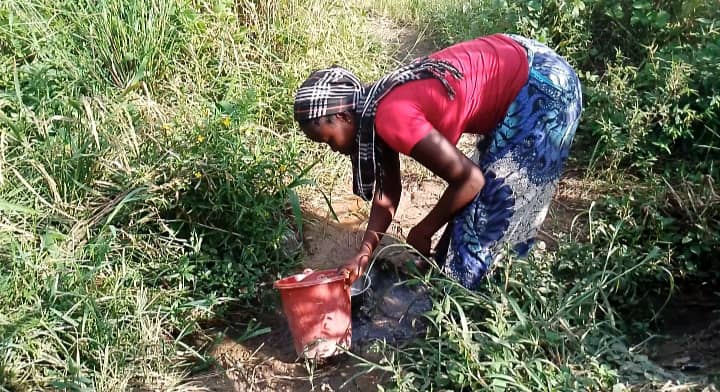
Hannatu Ismail fetching water from a stream in Womio.
According to a 2019 survey by the National Bureau of Statistics,only nine per cent of the population have access to complete basic Water Sanitation and Hygiene (WASH) services and those living in rural areas are two times more disadvantaged than those in urban areas.
In another report, approximately 60 million Nigerians were living without access to basic drinking water,80 million people had no access to improved sanitation facilities, while 167 million have no access to basic hand washing facilities.
It is a well known fact that unsafe water, inadequate sanitation and poor hygiene affects good health playing a crucial role in spreading diseases like cholera, diarrhea and typhoid.
Hannatu like any other residents of Womio, a small community in Sabo Anagada, Gwagwalada Area Council, Abuja complained that her children had diarrhoea due to the water they consumed.
The village head of Womio, Muhammadu Haruna, confirmed incidence of disease outbreak in his community.
He said the water they got from the stream isn’t hygienic adding that people who consume the water usually suffer from vomitting and diarrhoea with blood particles seen in their excretion.
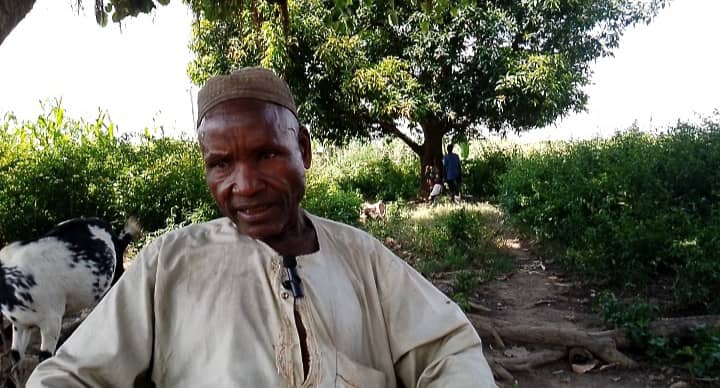
Village head of Womio
The practice of Open defecation
Open defecation has become a norm in the community as villagers defecate in nearby bushes due to unavailability of toilet facility.
They do not build toilets in their houses, they only find a space they can take their bath and ease themselves in bushes.
“If you just enter the area you will see faeces everywhere,we don’t have water,we fetch from the stream which is mostly dirty.
“When you enter the community, you will see feaces everywhere which attract mosquitoes and flies that cause malaria and cholera respectively “,she said.
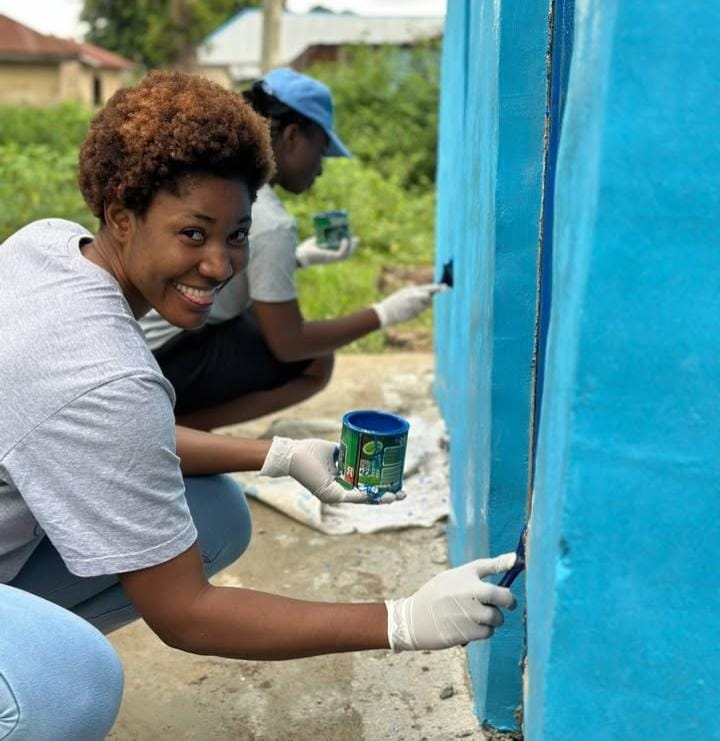
Members of Rockians Foundation constructing a toilet.
WASH intervention in Womio
Womio village had two boreholes commissioned by the government ,but it was not functioning due to some fault it developed while on use. This situation made members of the community to resort back to their old ways of getting water, the stream.
Due to the critical condition of Womio community, a Non- Governmental Organisation ,Rockians Medical Foundation rehabilitated a hand pump borehole and constructed a four unit toilets.
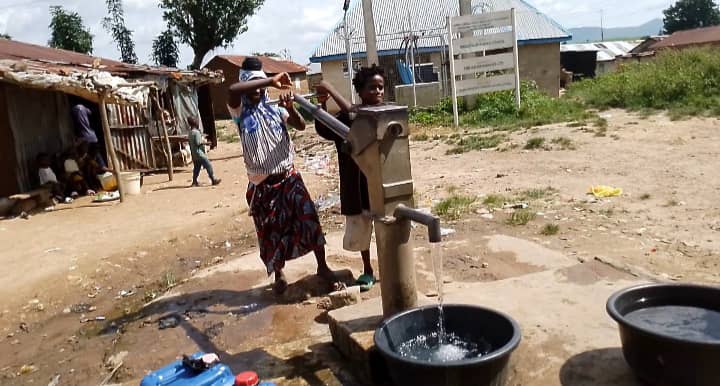
Villagers at the rehabilitated hand pump.
Martins Marvin, Chairman of the foundation stated that the plight of not having clean water and decent sanitation and hygiene facility led to the foundation’s intervention in the community.
“We were able to restructure their already existing bore hole;We did not stop there we also had to take it further by strengthening the wash practices in this village.
“So we had to also raise a sanitation facility, public toilet because we noticed that all of them did not have private facilities that they are using in their homes”,he said.
Building with bottles
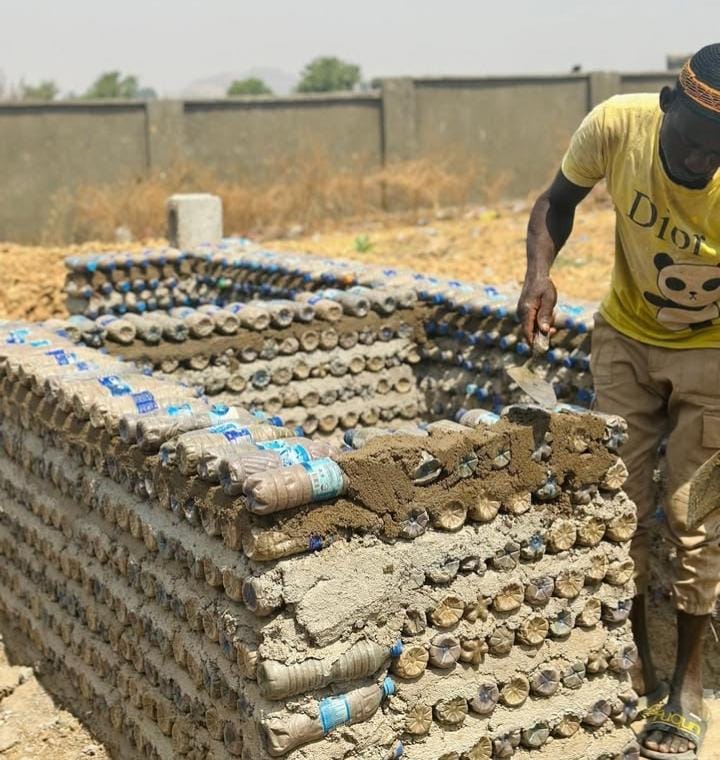
Womio resident participating in building the bottle toilet.
The four units public toilets built by the foundation was not an ordinary toilet. It was built using pet bottles filled with sand which was used as building blocks for the project.
“We call it the “CLEAR ” village project, meaning; Community Learn Environmental Awareness and Recycling. Because, it’s not just a project that will help to strengthen the wash practices in the village.
“It is by providing a safe and healthy space for women to carry out their extra hygiene and also to help eradicate open defecation in the village “,he said.
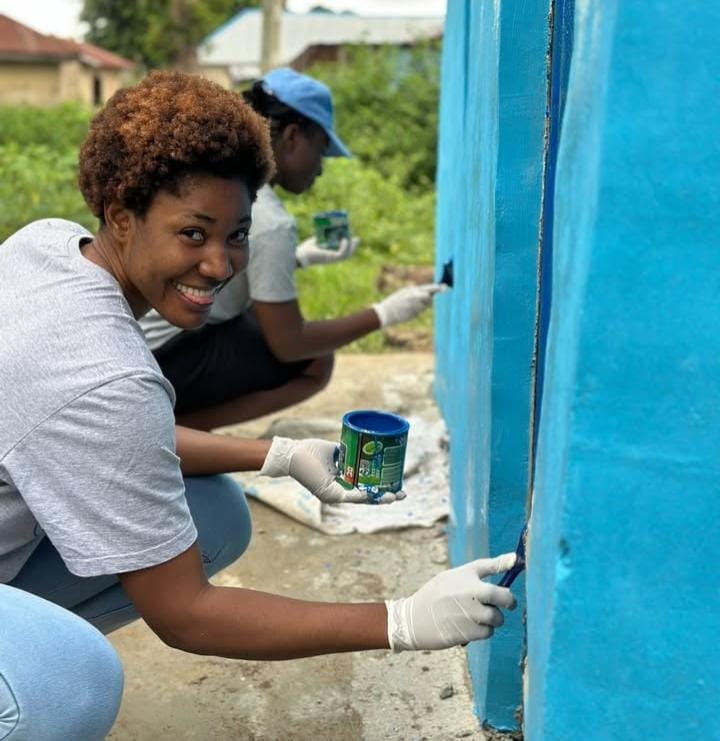
Staff of the foundation painting the toilet.
He said that community members supported the project by helping in filling the pet bottles with sand and sweeping the premises.
Villagers can now access WASH facility
After a long period of distance walk to get water, the unhygienic nature of the water and the practice of open defecation , the people of Womio can now access clean drinking water and ease themselves in proper toilet facility.
Haruna, stated that since the hand pump was rehabilitated, his people have been enjoying relatively gPpood health.
He added that members of the community as well as visitors from neighbouring village come to ease theirselves in the toilets.
Hannatu, whose children went to school late and sometimes miss school due to unavailability of portable clean water are now going to school early and even had breakfast before going.
“My children and I don’t need to go to the stream to get water, I can now access clean water to cook, drink and do other house chores .
“Now my children don’t get sick as frequent as before and the feaces we usually see everywhere has reduced due to the use of the newly constructed toilets “,she said.
Sustaining the intervention
Lack of maintenance attitude towards a given project or intervention in a community has been the major reason some intervention fail.
This made Rokian Medical Foundation to sensitise the villagers on the need to properly maintain and take care of the toilets while also educating them on the importance of taking ownership of the project.
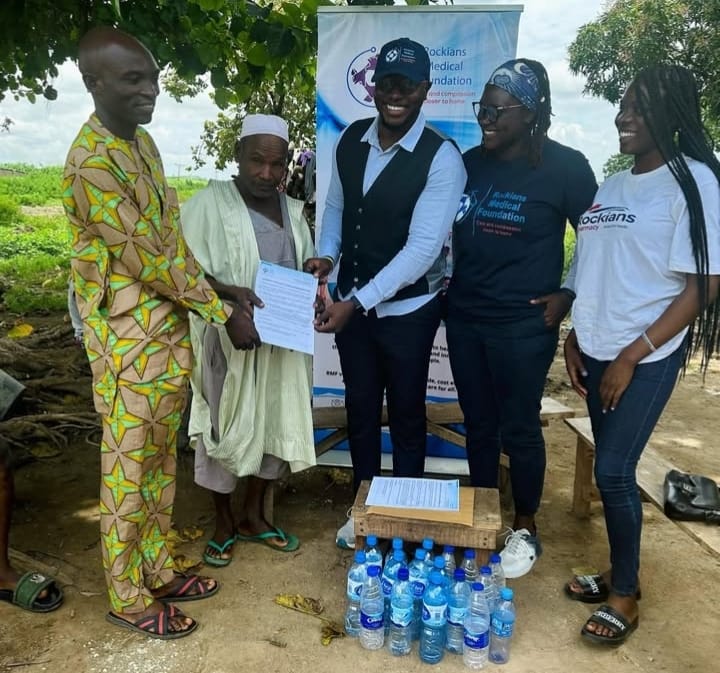
Executives of the foundation presenting certificate to Womio village head.
“We ensure that we engaged the community leaders to educate them on step by step proces of keeping the facility clean .
“We urged the village head,youth leader and women leader to come up with a roster for cleaning the toilets; the foundation would be conducting a routine check in the community to ensure that the facility is clean”,he said.
The village head explained that whenever a facility gets faulty,he would call his people and inform them on the need to make contributions so that they can make repairs.
He said villagers were using the toilets adding that anyone who wanted to use it must come along with water for cleaning while a roster for cleaning the toilet on ground.
Ease cut short
As people of Womio celebrate having clean water supply from the rehabilitated hand pump, their happiness is cut short one more time. This is because the only source of clean water in community keeps developing fault after a month or two use.
The villagers attributed the incessant fault to over use saying it is the only functional pump serving the whole community.
Mr Samuel Nuhu, the youth leader of the community said , the single hand pump was not enough for a community of more than 3,000 population .
He added that whenever the pump gets spoilt, people suffer to get water with some going back to the streams while others buy water.
According to him, residents of the area can not afford to contribute for the maintenance of the facility urging government and other non governmental organisation to bring more borehole that would reach everyone.
Women leader of the community, Hajara Adamu who commended the foundation for its effort stated that said the hand pump has developed fault for the third time since repair.
A situation that led the villagers to buy water from a neighbouring village at exorbitant price.
“We are back to square one, suffering again; one bucket is N100, what about those that don’t have money? How would they fend?
“We will appreciate it if more boreholes would be constructed to ease our suffering”,she said.
Room for improvement
The four units toilets constructed has helped reduced open defecation in the community. However, residents of Womio want more.
The village head of Womio commended Rockians Medical Foundation for the project saying it has helped both men and women access toilet facility.
He urged government and other stakeholders to assist them build more toilets adding that some residents’ houses were far from the toilet,a situation making them go back to open defecation.
Similarly, Nuhu added that water was not connected to the toilets saying that the villagers had to get water from the pump before using the toilets.
He says , water connection in the toilets would help keep the environment clean and safe.
However, the chairman of the foundation stated that inadequate finance played a major in limitations of the project.
He explained that members of the foundation tasked themselves and volunteer with the little they could get in ensuring people have access to clean water and their health improved.(NAN)
**If used, credit the writer and the News Agency of Nigeria (NAN)
***This story is with the support of the Solutions Journalism Network (SJN) and Nigeria Health Watch (NHW).
By Ibukun Emiola (News Agency of Nigeria)
A father of two and an artisan, Mr Sola Famakinwa, lamented how the recent poor banking services in Nigeria have negatively affected his business, leading to untold losses.
Famakinwa is one of many Nigerians who have been frustrated and deprived of excellent digital financial services while using mobile or internet banking.
“Digital banking services are not too good at this time. My experience with my bank has affected my business negatively, especially since online banking services are very poor, one cannot do a transfer to customers due to network failure.
“Presently, we have a money transfer transaction that has been hanging for the past 3 days. This incident has made us lose our credibility with our customers,” Famakinwa said.
According to him, running day-to-day business activities has become difficult amidst economic challenges that have made life tough for common Nigerians.
Another respondent, a Civil Servant, Mrs Olanrewaju Idowu, said other negative aspects of digital banking services can sometimes discourage people.
“I can call the banking system a necessary evil because the rate at which they deduct money, called charges, is not encouraging at all, among other things,”
Also, a Staff of a private company, Gboyega Balogun said poor digital banking services affected his livelihood due to delays in online service and unfriendly customer service to complaints on failed transfers or declined PoS transactions.
“Most times the queues are much and people are choked up and discouraged when they are not attended to in a good way.
“Most people now use other apps like Moniepoint and Opay and they prefer them to going to the bank because these other apps don’t deduct their money unnecessarily without notice or knowing.
“Most banks deduct fees for digital banking services without ensuring customers know the reasons behind the action(s),” Balogun said.
Another respondent, a Banker, Mr Olaoluwa Sijuade, said he had a very bad experience with the digital banking services in spite of being a bank staff himself.
“I sent N3 million through Moniepoint into Guaranty Trust Bank and it took almost a month before it was successfully.
“Sorting this took much of my time and strength plus mental health, but we give glory to God it was sorted out successfully,” Sijuade said.
Regulatory directives to address the issue
Addressing this disruption, the Central Bank of Nigeria (CBN) has provided some policies and directives to address poor banking services.
According to the apex bank, banks must respond to customer complaints within 72 hours, adding that banks that fail to do so will be fined N100,000 per day.
But this directive has remained a mirage as many Nigerians have many unresolved complaints for months with no respite in sight.
A Trader at Sasa Market, Mrs Aina Ajagbe, said she had been coming to the bank for weeks over the same issue.
“Each time, I came I spent N2000 for transportation. Apart from wasting transport fare, I am also wasting time that I could have used to sell my goods each time I visit the bank,” Ajagbe said.
A Businessman, Mr Mayowa Olayinka, said a failed PoS Transaction transfer he did in September has yet to be resolved in spite of going to the bank several times.
“What the CBN said is only on paper but in practice, Nigerians are suffering untold hardship with how banks handle customers’ complaints on digital transactions, from poor customer relations to unresolved transfers among other things,” Olayinka noted.
In an interview with Mr Williams Uko, the Head of Strategy and Research, Nigeria Interbank Settlement System (NIBSS), said the apex bank has guidelines to reverse failed transactions immediately.
“Ideally, the bank has taken the money, and has kept it, right? There was a problem. It’s supposed to refund it immediately.
“But what some institutions do is, while they are still trying to reconcile, they hold on to the funds. That was what the CBN was kicking against.
“As soon as a message comes that it has failed, there should be an instant reversal, which oftentimes, it’s not,” Uko said.
Also, the Head of Digital Skills and Services, Nigerian Communications Commission, Mrs Hauwa Wakili, identified vandalisation as the biggest issue hindering connectivity.
According to her, vandalisation of connectivity infrastructure is now a criminal offence, adding that digital financial services require internet connectivity to make the services seamless.
“So, even the traditional banks that we used to know them, are adopting and are using improved, more innovative equipment that relies heavily on the internet.
“And that is why you see the demand for 5G technology because of speed and the volume of transactions,” she said.
Wakili stated that the 74 per cent financial inclusion that was achieved, which is also a modest improvement, was largely due to these digital payments.
“So, digital payments heavily rely on that connectivity and that is why we have also increased our collaboration with CBN.
“So, that again, we work together to harmonise wherever there is internet provision, there is digital infrastructure, there is connectivity, they also deploy their services.
According to her, the CBN and NCC report stated that 301 communities are still financially excluded, adding that the issue of vandalisation must be resolved so that it helped bridge the connectivity gap.
Experts’ opinion on the matter
A bank staff, who spoke on the situation, stated that the present disruption in the banking system was because the top five banks in Nigeria are changing their banking application almost at the same time.
He added that these banks serve about 80 to 85 per cent of the banking population in Nigeria.
“With the teething face that comes with upgrading or changing of banking applications, core banking applications at that, there is bound to be disruption in digital banking services.
“So that was what happened or what was seen in recent times. But by and large, I guess it will settle at some point. I hope it will be quickly too,” the banker said.
A FinTech Expert and Founder of Imalipay, Mr Oluwasanmi Akinmusire, said the financial sector in Nigeria has been facing many challenges in delivering seamless digital services to its customers.
“With a population as large as ours, you can tell that, ultimately, and unfortunately, we are still dealing with a lot of exclusion from financial services.
“One major factor that makes this so is the continuous loss of talent to other countries. Chiefly, the very best minds in technology who are supposed to drive innovation and stability in the sector from a service delivery point of view.
“We don’t have to go too far to ask why this is so. These talents have decided to make other countries their home, thereby leaving a serious gap that becomes challenging to fill,” Akinmusire said.
He stated that it was pertinent that a more deliberate approach be taken which would be to ensure “our talents” which are Nigerian technological experts and professionals, are sold into the vision of Nigeria.
“It is not enough to offer large salaries anymore. With the world becoming smaller every day through technology, the competition is becoming steeper for the scarce talents out there,” Akinmusire said.(NAN)
***This report is produced under the DPI Africa Journalism Fellowship Programme of the Media Foundation for West Africa and Co-Develop.
By Bushrah Yusuf-Badmus, News Agency of Nigeria (NAN)
Mrs Elizabeth Ndako has been a smallholder farmer for many years. She grows grains and tubers in Patigi, Patigi Local Government Area of Kwara state. To boost her production, Ndako spends close to N300,000 on agro-chemical to increase productivity and keep farm produce from pests.
“Normally, I spend close to N300,000 on fertilizer and herbicides yearly if I do not want to waste my farm inputs.
“This is always a Herculean task for me yearly, because after buying these things, we have little or nothing to feed on before the things we planted grow,’’ she said.
At one point, however, this woman farmer could not afford the money as the price for the fertiliser kept increasing as a result of Nigeria’s economic situation.
Ndako started using chicken poop and spoilt foods as a means to an end when fertilisers were no longer affordable for her, but ironically, they ended up giving her more yields than expected.
‘’I have been using chicken poop and plant waste which I later learnt is called organic fertilizer for the past eight years, and I have never for once regretted it. It gives me more yield than when I was using chemical fertilizer.
‘’Another thing I noticed while using it is that the soil is not easily washed away when it rains compared to when I was using the chemical fertilizer,’’ she said.
This experience resonated with other smallholder women farmers, who are responsible for the bulk of food items in the market.
As the world grapples with the global economic and food crisis and the effects of the COVID-19 pandemic, Nigerians are not left out in finding means to, among all things, ensure food security and sustainability.
Women farmers play a key role in household food security and nutrition. Empowering female farmers can increase the availability of diverse and nutritious foods, improving family and community health.
Nigerian farmers face several constraints such as limited access to education, land, credit facilities and poor distribution networks. These results to low yields and high wastage rate during harvesting, processing and storage therefore reducing available food supply and rural women’s income.
With the hard means of survival and difficulty in feeding, more Nigerians women have gone into farming to feed themselves and family members, before they see it as a money making venture.
But surprisingly as many farmers are investing in planting and harvesting, based on the World Bank projections, about 40 per cent of Nigerians are estimated to still live below the international poverty line by the end of 2024.
Just like other developing countries, poverty in Nigeria is highly gendered. Although women make up about 50 per cent of Nigeria’s population, more than 60 per cent of them live in extreme poverty, majority of them are rural women.
Incidentally, the category of rural women is where the Small scale Women Farmers Organisation of Nigeria (SWOFON) members are. They farm basically to feed their immediate family and sell the remaining proceeds to earn a living. But with the high cost of fertilizer and herbicides, they suffer setbacks on their farms.
Their quest was to find an alternative to straining their lean purse to improve their yields, little did they know that they are working towards climate change mitigation.
Succour, however, came the way of some in Nigeria when in 2020, the Centre for Community Empowerment and Poverty Eradication (CCEPE) trained women farmers on the use of dung and plant wastes as organic fertiliser and pesticides
CCEPE trained 40 women farmers in Asa local government area, and 20 women farmers in Kaima local government of Kwara state, on how to make and use organic fertilisers and herbicides on their farms.
CCEPE Executive Director, Mr Abdurrahman Ayuba, said the training was organised in the face of ravaging impacts of climate change and the economic status of the women farmers.
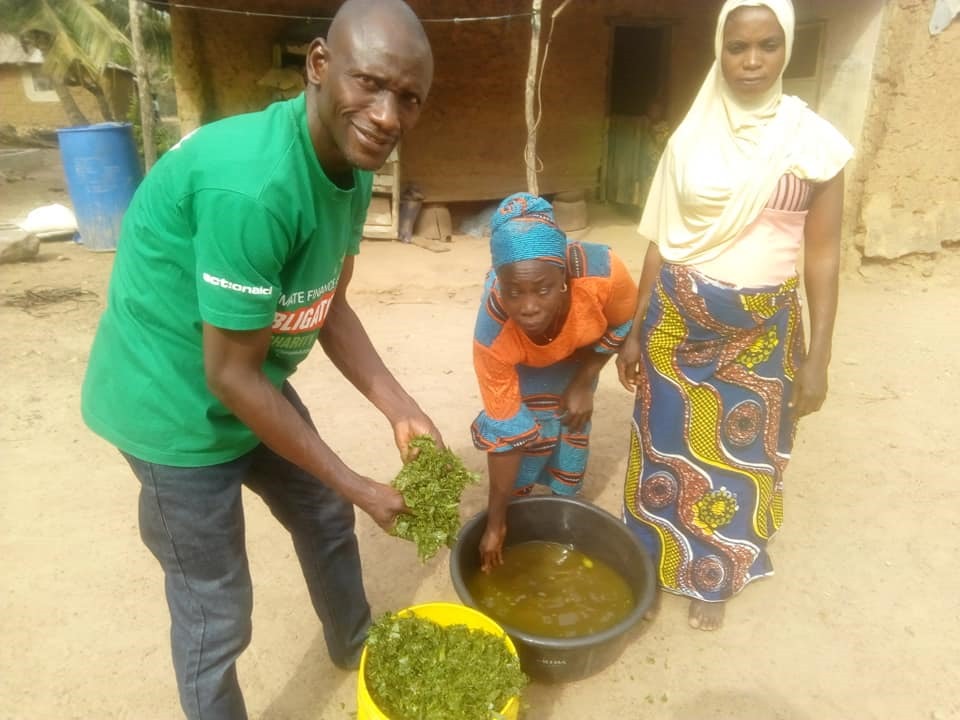
CCEPE Executive Director, Mr Abdurrahman Ayuba and some women farmers at the training.
“We tend to look at alternatives to the high cost of farm inputs and how to support these women to source locally for their farming business without necessarily impacting negatively on their income and little money they have with them.
“By the time they use half of their income to procure fertiliser which is not readily available and also source expensive agro chemicals like pesticides, herbicides, they have little or nothing left to feed,’’ he said.
Mrs Ndako, who is also the SWOFON Coordinator in Kwara, said though the advantages of the organic fertilizer were enormous, they are slow in response compared to chemical fertiliser, but the wait was always worth it.
She appealed to the government to help in creating more awareness and education on organic fertiliser as it is more affordable for those in the rural areas.
One of the beneficiaries of the training, Mrs Sadiat Rasaki, from Omole, Asa local government, said the organic herbicides they were taught by using neem leaf helped her restore her farm that was almost consumed by insects and pests.
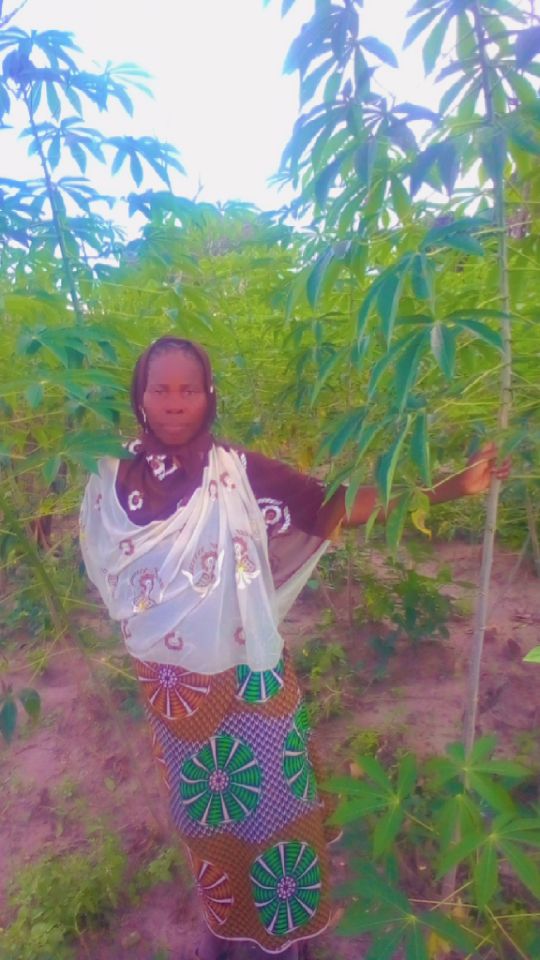
Mrs Sadiat Rasaki
“The training on herbicides was an answered prayer at that time because insects took over my farm and I couldn’t afford chemical herbicides, but when I used neem leaf the way we were taught, it was as if nothing happened to it before.
“Surprisingly, it didn’t affect the farm produce by the time they were harvested because that was my initial fear.
“That was what made me try to use the organic fertilizer as we were taught too, because I did not believe it could work.
“The year I first used organic fertilizer was the first year I had a bountiful harvest which are also good looking,’’ she said.
Another beneficiary, Alhaja Titi Ade-Salam, said prior to the training, she uses food remnants as fertiliser, and ashes as herbicides, but she doesn’t know the benefits accrued to it other than the fact that it saves her cost of purchasing fertilizer of almost N200,000 yearly.
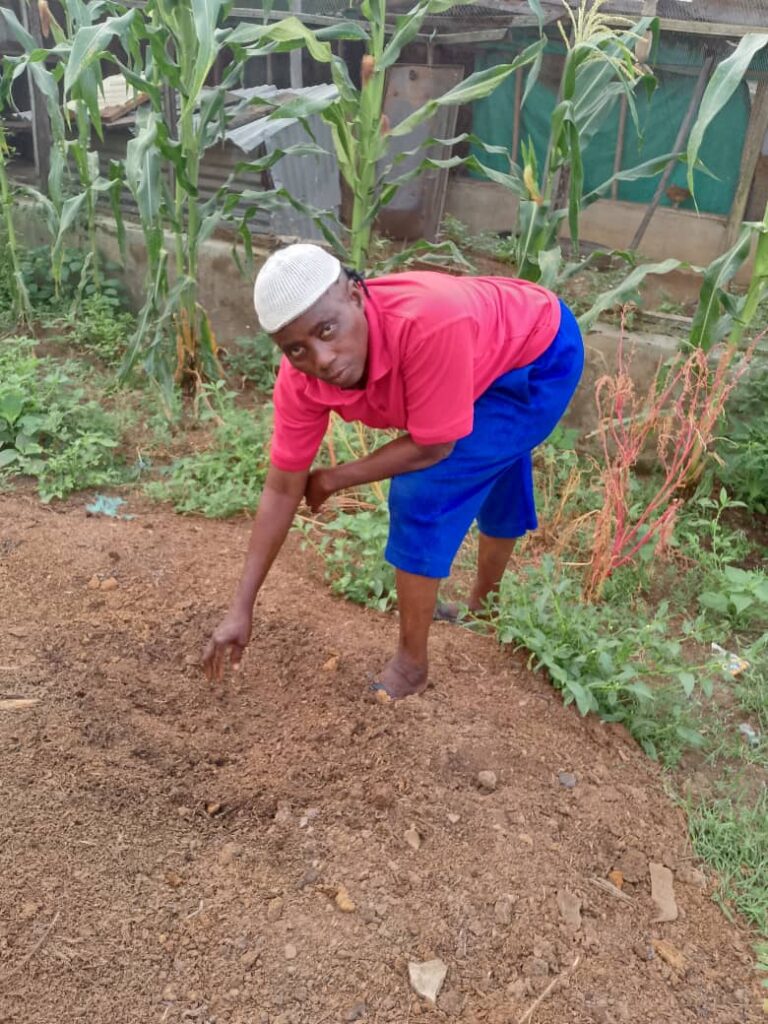
Mrs Titi Ade-Salam
‘’We had the belief that chemical fertilizer is the best, but we were told that it makes the soil infertile, that organic improves the soil fertility.
‘’For herbicides, we were taught how to use neem leaves and black soap and for fertiliser, we were told to use chicken poop, goat poop and food remnants, but I have been using food remannts before the training.
“Using organic, my farm produce now have good yields and look attractive and greener than before. It is pocket friendly and easily accessible, compared to the chemical ones that the cheapest is N5,000.
“I urge farmers to make more enquiries on it to amass the benefits and also ensure that we are eating right from what we planted.”
The trainees, however, did not keep the knowledge to themselves, as a secondary beneficiary, Hajia Sherifat Ibrahim, from Ilorin South local government, said she learnt from one of the participants that biodegradable wastes can be used as manure.
Mrs Ibrahim said she gave it a trial when she couldn’t afford fertiliser (costing about N250,000) to boost the maize and vegetables she planted.
“Then, I bought five bags of chicken poo for N1500, and the maize and vegetables I planted them with, became the envy of my community members.
“Even my mentor in farming was surprised and he had to ditch the chemical fertilizer he bought for the organic ones as his maize has small seeds compared to my own. I had to give him out of my harvest that year.
‘’The maize looks like the premier seeds, very big like what we used to call Farmer’s seed then.
“We need more awareness because this will go a long way in reducing the financial strain on farmers and at the same time help the environment to be safe.
“The challenge we have regarding it now is that a bag of chicken poop is now N5000 per 100 kg and it is always heavy to carry for us as women,’’ she said.
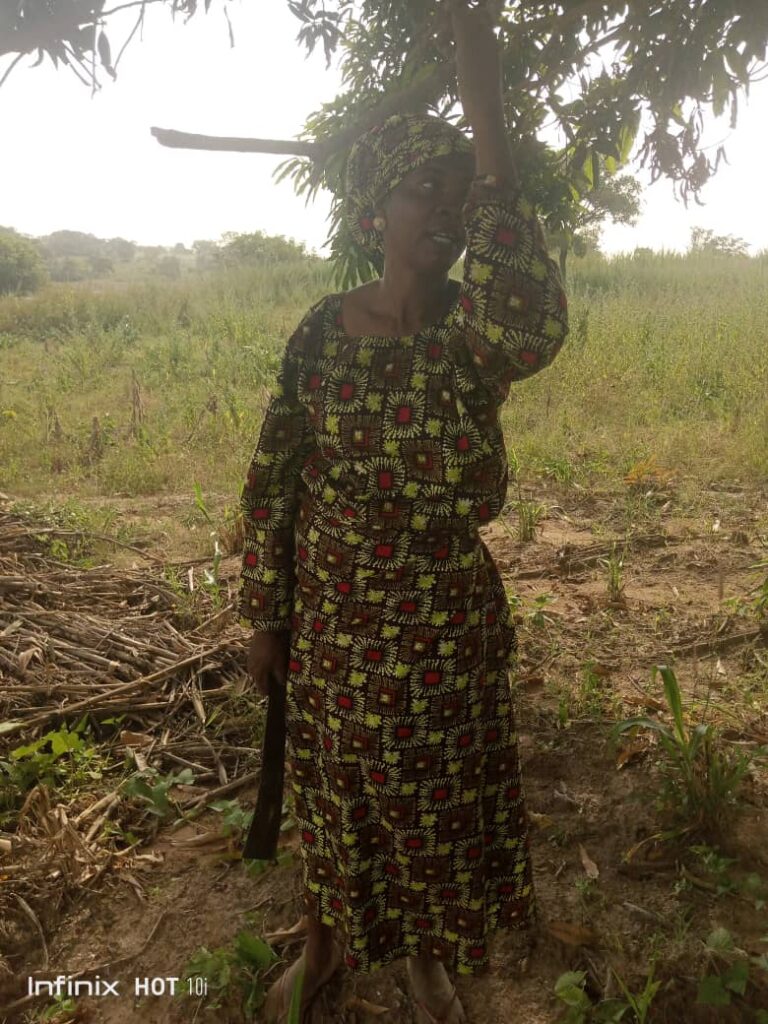
Hajia Sherifat Ibrahim
Another secondary beneficiary, Mrs Funmilayo Lawal, who farms in Odoore, said she used chicken poop on a section of her farm where she planted vegetables to test the efficacy and was surprised at how well they turned out.
‘’I was not part of those that were trained, but our members told me that organic fertilizer makes farm produce really green and with big seeds.
‘’I have up to an hectare of farm, so I used it on a particular section and use chemical fertilizer on other parts to see the difference, I discovered that the organic works better than the chemical, though the result is slow compared to when the chemical one is used.
‘’I use it mostly to plant tomatoes, Okra and vegetables and the difference is very clear.
“My farm is in Odoore and I plant rice, maize, guinea corn, beans and vegetables. I sell most of my farm produce and consume just little out of all, but I often give out vegetables after taking what I want.”
Highlighting the importance of organic fertilisers and herbicides to the environment, Dr Sa’adat Yusuf of the Department of Crop Protection, University of Ilorin, who was the training facilitator, said the use of organic fertilisers and herbicides was long overdue, in the face of the effect of climate change on crops.
She said organic fertilisers and herbicides are boosters that are not based on chemicals, but naturally occuring which helps to address the issue of resistance to chemicals.
‘’When you use chemical fertiliser and herbicides for a long time, it will get to a point when the pests and the soil becomes resistant to the chemicals and it will no longer be effective.
“Also, it is environmentally friendly. When you use organic products, the environment becomes cleaner, the plants used to develop the crops are degradable and by the time they decompose, they improve the fertility of the soil.
‘’Then they are pocket friendly because neem leaves that we experimented with, can be gotten almost everywhere. So, at the end of the day, it improves the profit margin of the farmers,’’ she said.
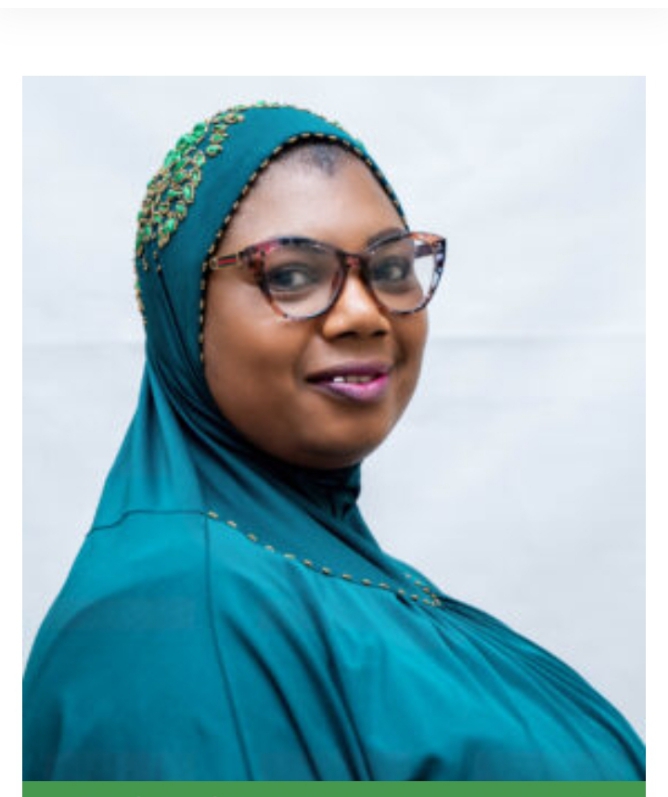
Dr Sa’adat Yusuf
The university don said the farmers were trained on how to use neem leaves and seeds.
‘’The major ingredient we used during the training is Neem leaves. We trained them on how to use neem to produce fertilizer and to protect crops against pests.
“They were taken through how to use neem plant to protect their crops starting from the leaves, seeds and how to extract the oil in order to protect their stored produce.
“The residues were also incorporated into the soil to serve as fertiliser to improve the soil fertility,’’ Dr Yusuf said.
She, however, called on the government to key into it by producing these organic fertilizer and herbicides in large quantity, so that more people can key into its usage.
‘’The government can establish factories where they will produce these things in a large scale and pack them for the farmers to begin to buy just like they buy the chemical fertilizer.
‘’This will go a long way to promote the usage of organic fertiliser and pesticides,’’ she said. (NAN) (www.nannews.ng)
**If used, please credit the writer and the News Agency of Nigeria (NAN)
***This story is done with support from the Solutions Journalism Network (SJN) and the Nigeria Health Watch (NHW).
Paving the healing road for child survivors of sexual abuse
By Adebola Adegoke, News Agency of Nigeria (NAN)
Ms Eno (not real name) was devastated when she discovered that her 14-year-old niece, who was under her care was defiled and impregnated by her sister’s brother in-law.
“Before we could know, the pregnancy was already five months and even in the school, they didn’t notice because of the kind of body she has.
“I started questioning her, who is responsible? She said that it’s my sister’s husband’s brother. He had been coming to the house to defile her when I am not around,” she said.

Child sexual abuse is a grave public health crisis in Nigeria, robbing many children of their innocence and safety.
Reports show that 90 per cent of abusers are familiar to the victims, making it even more challenging for the affected children to seek help.
Also, for those children who have reported violence, fewer than five out of a 100 received any form of support, according to the United Nations Children’s Fund (UNICEF).
Many survivors are unaware of how to report abuse or access support services.
However, a child-centred non-profit organisation, Cece Yara Child Advocacy Centre Foundation, is providing comprehensive care, protection, and legal assistance to child survivors of sexual abuse and those at risk.

Eno said she was introduced to Cece Yara Foundation through her friend, after all efforts to hold the perpetrator accountable proved abortive.
“The boy denied the first time but he later said he was responsible. I first got him arrested after he abandoned my niece and refused to take care of her. So his brother came to plead with me and he was bailed.
“After he was bailed, the boy, his brother and my sister started insulting me saying that with all my anger, there was nothing I could do.
“This got me angry and I started looking for ways to ensure he was charged and went to jail. I told people and one of my friends introduced me to Cece Yara Foundation.
“They took up the case free of charge and they have been providing legal services and managing the court case since then.
“When my niece was put to bed, the foundation also helped to take care of medical bills incurred during the process.”
Eno revealed that since the incident, she had also received a lot of backlash from her sister and her husband who were aware of the abuse but kept it hidden.
Experts and advocates say the stigma associated with abuse and the culture of silence by discourage survivors from speaking out and seeking help.
21 year-old Amina (not real name) did not hesitate to report her step father who had serially defiled his 11 years old biological daughter.
Amina narrated: “My half-sister came to me that her father, my step father, had molested and touched her inappropriately. I recorded it immediately she told me because he had tried to rape me in the past but he didn’t succeed.
“I reported to our Sunday school teacher in church who took us to Cece Yara at Gbagada. When we got to the place, my sister was questioned and they took up the case, provided medical and legal support. He was arrested and charged to court.”
This singular brave act that Amina showed had earned her a bad name in the family.
“I was thrown out of the family house for reporting the case. They said that I am the one that broke the family and took their son to jail.
“I have nowhere to go and I am currently staying in church while my half siblings are in a shelter provided by the Lagos State Government while the case is still on-going,” she said.
A Multidisciplinary Approach to Child Protection

According to Mrs Bisi Ajayi-Kayode, Chief Executive Officer (CEO) of Cece Yara, the foundation employs a multidisciplinary team approach to comprehensively address the needs of children affected by sexual abuse.
This approach, she said, recognised that no single agency can provide all the necessary support, from case reporting to psychotherapy, legal information, access to justice, and family reunion.
“Our online reporting system and partnerships with schools, religious bodies, and government agencies ensure that children in need can access support at any time.
“The foundation offers a one-stop response that profiles the necessary interventions for each child, emphasising the importance of interagency collaboration,” she said.
According to her, the foundation is particularly attentive to the peculiarity of each case, understanding that children abused by family members may face additional challenges, such as not being believed or supported.
“We deploy a case management team approach. Upon receiving reports of child abuse through our 24-hour helpline (0800 800 8001), website, mail or social media pages, the foundation’s social workers conduct verification and risk assessments, often in collaboration with the police.
“They assess the child’s living conditions and identify risks for vulnerable groups, including children from broken homes, orphans, children with disabilities, trafficked children, and those from marginalised communities.
“After verification, the foundation reports the case to the police and the Ministry of Youth and Social Development, assisting in the arrest of perpetrators and the relocation of affected children.
“For individuals needing financial assistance to escape abusive situations, we liaise with relevant government authorities,” she said.
She said that the foundation collaborates with the Lagos State Domestic and Sexual Violence Agency (DVSA), Office of the Public Defender (OPD) and the Ministry of Education.
In cases involving schools, they partner with the Education Quality Assurance Unit of the Ministry of Basic and Secondary Education in Lagos State.
Ajayi-Kayode says the foundation operates a shelter that can give temporary accommodation to 85 children, offering a safe and regulated environment where survivors can heal and rebuild their lives.
She said that children in the shelter are typically referred by the Lagos State Ministry of Youth and Social Development, especially cases where the perpetrator is a parent, and the non-offending parent either lacks the capacity to care for the child or is considered an accomplice.
She added that the foundation provides comprehensive psychosocial support, including counselling for the child, non-offending family members, and facilitating access to paediatric psychiatric care when needed.

Gbemisola Ogunrinde, Lead Psychotherapist at Cece Yara Child Advocacy Centre, emphasised the importance of psycho-education in empowering survivors with knowledge about personal safety, boundaries, and age-appropriate sex education and preventing reoccurrence of abuse.
Ogunrinde said that a key aspect of the intervention is moving at the survivor’s pace, especially when dealing with children who may be reluctant to speak.
She explained that this reluctance can stem from the trauma itself or feelings of guilt and discomfort.
“Art is another way they could express whatever hurt that they are experiencing as a result of the trauma providing an alternative outlet for those who may struggle with verbal expression.
“The initial counselling sessions focus on building rapport, with an emphasis on validation, affirmation, and encouragement. The process is gentle, and survivors are not forced to disclose their experiences until they are ready.”
Forensic Interviews
The National Children’s Advocacy Centre defines forensic interview as a single session, recorded interview designed to elicit a child’s unique information when there are concerns of possible abuse or when the child has witnessed violence against another person.
At Cece Yara Foundation, the forensic interview process is a critical component of their multidisciplinary approach to child protection.
Ajayi-Kayode explained that the child forensic interview is a structural process of eliciting information from a child about a crime or an event the child has refused to express in an age-appropriate and developmentally sensitive manner.
The foundation has trained judges, prosecutors, officials of the Lagos State ministry of justice, the police, the Office of the Director of Public Prosecutions (DPP) and other stakeholders on Child Forensic Interview, aimed at promoting justice and safeguarding the rights of vulnerable children.
“We are advocating for the adoption of a record-setter forensic interview and investigative protocol which will ensure that every survivor of child sexual abuse undergoes a forensic interview process that will facilitate effective investigation and prosecution of the case, thereby establishing a firm child-friendly justice system,” Ajayi-Kayode said.
Addressing Challenges and Advocating for Change
Securing justice and healing for survivors of sexual abuse still poses a great challenge for the foundation.
Ajayi Kayode said that a significant barrier to supporting children and accessing justice is the prevalence of negative socio-cultural complexities associated with case reporting, where some parents pressure their children to stay silent, fearing the consequences for the family, such as a parent or relative going to prison.
This was the case for Eno and Amina whose families had blacklisted them for reporting a family member and taking them to court.
She, however, said that the foundation was addressing this challenge through awareness and prevention campaigns against acts of child sexual abuse.
Ajayi-Kayode said that Cece Yara aims to shift societal attitudes and ensure children receive the support and justice they need.
“Also in the area of poverty, we see a lot of indigent clients that want to access our services and they are not able to do so.
“To support them, we provide logistics assistance, including transportation to the police station, medical unit, and our offices.
“We also address survivors’ fear of going to court, acting as a support system to help navigate the criminal justice system.
“We reassure survivors and their families that we will accompany them to court, as accessing justice is a crucial part of the healing process.
“To date, we have secured eight convictions in court, have filed about 78 cases, and have 57 on-going, ensuring that we keep the wheel of justice rolling.
“Our focus remains on maintaining high standards of support, and we seek additional funding to continue our work,” she said.(NAN)
***This story is with support from the Solutions Journalism Network and the Nigeria Health Watch.